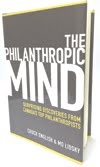The fundraising marketing world is awash in data. And much of it is very valuable. There are fascinating studies on on-line giving and behaviour. You can find the latest trends on shrinking email open and click through rates. Direct mail specialists will give you the most up-to-date analysis of response rates for various types of mailings.
In addition, smart marketers are doing their own research by polling and/or running focus groups with their organizational donors and constituents. Alternatively they are using studies conducted by similar organizations or the results of omnibus studies conducted by leading research organizations.
But at the end of the day, empathy still rules. I define empathy as the ability to put yourself in someone else’s shoes - to think like they think, to see what they see and ultimately to feel what they feel. The data can point you in the right direction, but to really connect with the donor or prospective donor, you have to know what’s in their head and more importantly their heart.
So, how can you gain this empathetic insight? Part of the answer is to always keep it top of mind. When I look at data, I am always thinking, “what does this tell me about my target group? What are the messages that would emanate from this data? What does it tell me about how people might react?”
Another obvious (but often overlooked) ingredient is just listening - and better yet eavesdropping. You need to know what people are talking about but accept the reality that when donors talk to a representative of an organization, they are likely more guarded about what they say. It may be frowned upon socially, but standing within earshot of a group of people and just listening can be very fruitful. And, the conversation doesn’t have to be about your organization or philanthropy. Some of my most inspired ideas have come from listening to what people are saying about seemingly banal topics. I heard one communications analyst say that the one of his most important tools was knowing what was being talked about on Oprah. Clearly, monitoring social media (blogs, facebook pages) is also a critical part of eavesdropping.
But finally I have to say that the ability to be empathetic may not be accessible to everyone. I actually believe its what distinguishes marketers who are able to get results. In the same way you may be prepared to pay for research, you may ultimately have to hire the talent that will allow you to make that research really work for your campaign or organization. It’s probably the best investment you can make.
Thursday, September 17, 2009
Subscribe to:
Posts (Atom)





